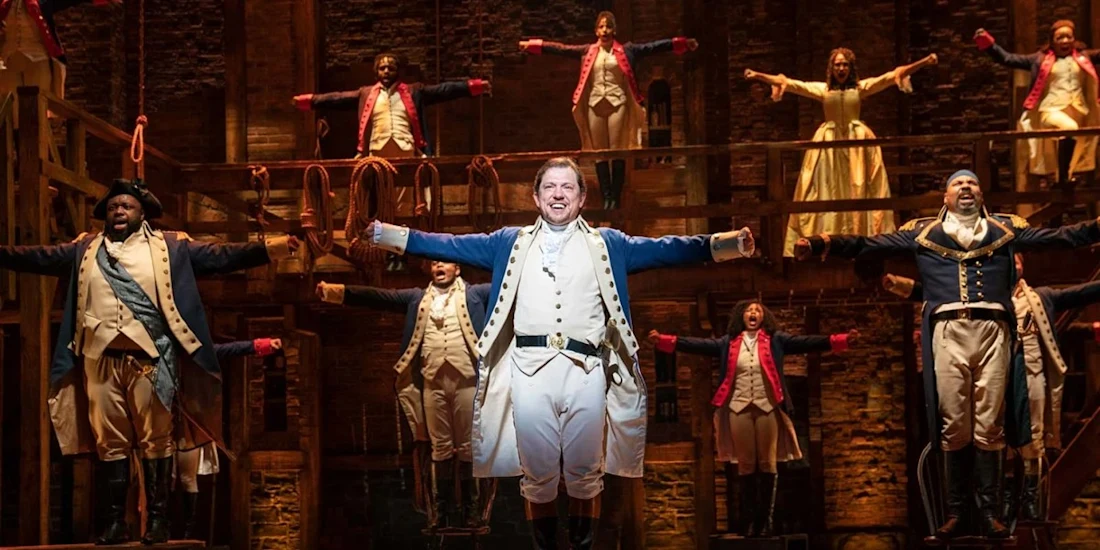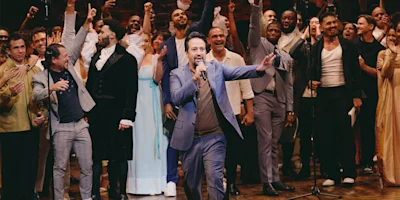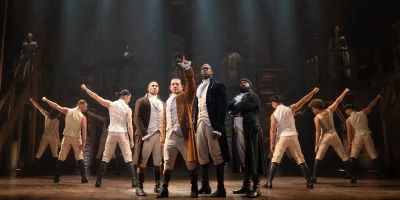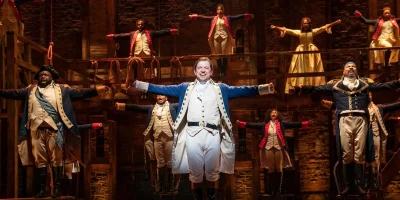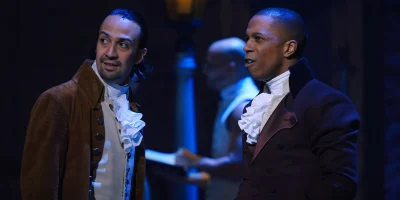
All the songs in 'Hamilton' on Broadway
Dive into the Tony-, Grammy-, and Pulitzer-winning music of the Alexander Hamilton musical, whose use of rap and hip-hop earned it a place in the history books.
Once in a generation, a musical comes along that redefines the genre. First, there was Show Boat, then Oklahoma!, then Company, then Rent. And in 2015 came Hamilton, on Broadway at the Richard Rodgers Theatre. This sung-through musical, with a book, musical, and lyrics by Lin-Manuel Miranda encourages audiences to reexamine their notions of who created America, and of who gets to tell this centuries-old story and how.
Even before winning 11 Tony Awards, a Grammy, and a Pulitzer Prize, the show became a global phenomenon. Hamilton made history come alive through modern music, proving that hip-hop belonged on a Broadway stage. A New York Theatre Guide article describes the groundbreaking Hamilton score as “Evita meets Les Misérables and 1776, by way of Notorious B.I.G.”
It would be impossible to track every bit of history, symbolism, and Easter egg in every song. In just one number, there are references to Mobb Deep, Eminem, the Notorious B.I.G., and Rodgers and Hammerstein. One could write a book about this score (and Miranda and Jeremy McCarter did: Hamilton: The Revolution.)
Even if you’ve watched the show or listened the cast album on repeat, there is so much subtext to appreciate with each new listen. Dive into the revolutionary music of Hamilton, and then enter the room where it happens — tickets are available for all performances now.
Get Hamilton tickets now.

"Alexander Hamilton"
“How does a bastard, orphan, son of a whore and a Scotsman, dropped in the middle of a forgotten spot in the Caribbean by Providence, impoverished, in squalor, grow up to be a hero and a scholar?” The show’s opening line is a question presented as a rap, brilliantly packed with exposition. It sets up the central conflict of the first act while also providing important backstory about Alexander Hamilton’s origins.
The song takes listeners through Hamilton’s entire childhood and adolescence; as Chernow noted, Miranda “accurately condensed the first 40 pages of my book into a four-minute song.” By the end of this opening number, the hardworking and ambitious Hamilton has sailed to New York City, determined to make something of himself.
“Alexander Hamilton” is primarily sung by Aaron Burr, who serves as a foil to Hamilton throughout the show. (Burr is also “the damn fool that shot him,” as he sings.) Just as Che tells the story of Evita and Judas narrates Jesus Christ Superstar, Hamilton’s antagonist is the musical’s main narrator.
Miranda first performed an early version of the song for Obama at the White House in 2009.
"Aaron Burr, Sir"
The first time Alexander Hamilton and Aaron Burr meet, Hamilton praises Burr, who fast-tracked college as Hamilton wants to do. Miranda sets up a rhyme scheme with “Burr, sir” that continues throughout the show (“sure, sir/bursar”; "Mercer”) in which the second to last syllable is a pure rhyme and the last syllable is an identity. This rhyming technique is seemingly a tribute to the rapper Cam’ron – one of the many hip-hop Easter eggs throughout the show.
Burr cautions Hamilton to “talk less, smile more.” Of course, Hamilton doesn’t take this advice to heart, but it gives the audience an insight into Burr’s philosophy. Hamilton retorts, “If you stand for nothing, Burr, what’ll you fall for?”
"My Shot"
This number is Hamilton’s “I want” song, in which Hamilton states, “I am not throwing away my shot.” On the surface, this song depicts Hamilton’s ambition and desire to be a part of America's founding — “I’m just like my country, I’m young, scrappy, and hungry” — but the use of gunshot imagery also foreshadows his fateful duel with Burr. Historians still debate whether Hamilton intended to "throw away his shot" or actually aim to kill Burr.
Hamilton calls on his fellow citizens to “rise up” against tyrannical England and considers the financial and ethical future of the country: “If we win our independence, is that a guarantee of freedom for our descendants?”
Miranda wrote Hamilton in the early days of the Black Lives Matter movement and was cognizant of the parallels. “We’re screaming ‘Rise up,’ and a lot of people are feeling that way,” he told The New Yorker in 2015.
"The Story of Tonight"
Over drinks, Hamilton and his friends express their willingness to die for the Revolutionary cause and consider their legacy. “And when our children tell our story, they’ll tell the story of tonight.” Although the song feels reminiscent of the revolutionaries' “Drink with Me” in Les Mis, Miranda shares, in Hamilton the Revolution, that the lyrics are actually inspired by Charlie, Frank, and Mary from Stephen Sondheim’s Merrily We Roll Along. The music is based on a composition Miranda penned in high school — perhaps that’s why it’s the first non-hip-hip song in the show.

"The Schuyler Sisters"
Angelica, Eliza, and Peggy Schuyler are introduced in a song reminiscent of Destiny’s Child’s early ‘00s R&B hits. Hamilton orchestrator and arranger Alex Lacamoire took inspiration from “Bills, Bills, Bills” and “Bootylicious” when arranging this song.
The three wealthy sisters are immersed in the spirit of the Revolution. Angelica and Eliza are excited at the “new ideas in the air,” while Peggy is more timid. A proto-feminist, Angelica is looking for “a mind at work” — someone like Hamilton, although she doesn’t know it yet.
"Farmer Refuted"
This song is based on public letters between loyalist Samuel Seabury and patriot Alexander Hamilton. In his response to Seabury, Hamilton points out grievances the colonists had against King George III, such as the tea tax that led to the Boston Tea Party. The music also refutes Seabury; it makes frequent use of counterpoint and puns. “Don’t modulate the key and not debate with me,” Hamilton sings.
Seabury’s language is more much formal: "Heed not the rabble who scream 'revolution.'" Unlike the show’s hip-hop numbers, this song's orchestrations call for more period instruments such as the harpsichord. Miranda was influenced by 1776 the musical; Samuel Seabury would’ve been right at home with John Dickinson and his posse of “Cool, Considerate Men.”
"You’ll Be Back"
With this song, King George III makes the first of his three appearances in the show. His song is best described as "the Beatles meets Baroque England." (Cue the harpsichord.) King George is presented as a petulant, manipulative lover who can’t comprehend he has been dumped: “You’ll be back, soon you’ll see. You’ll remember you belong to me.” The king’s rhymes and melodies are more simple and traditional than the rapid-fire lyrics of the revolutionaries.
"Right Hand Man"
From George III to George Washington! This song introduces war hero Washington as “the model of a modern major general.” Like Gilbert and Sullivan’s original "modern major general" song from The Pirates of Penzance, Washington’s lyrics contain alliteration: the “venerated Virginian veteran” sings of “embellishing my elegance and eloquence.”
He is in desperate need of a “right hand man” to help him win the war and chooses Hamilton. Washington advises the battle-hungry upstart, “Dying is easy, young man. Living is harder.” Hamilton decides not to "throw away his shot" and accepts Washington’s offer.
"A Winter’s Ball"
During the winter of 1780, Washington’s troops camped out in Morristown, New Jersey. Chernow wrote of how the officers attended dances at the commissary’s storehouse. Burr sets the scene for an all-important interaction: when Hamilton meets the Schuyler sisters at one such ball.
Burr also notes that Hamilton is a ladies’ man and tosses out what might be the most bizarre historical fact of the show: “Martha Washington named her feral tomcat after him.”

"Helpless"
The story of Eliza Schuyler and Alexander Hamilton’s first meeting and whirlwind courtship is told here from Eliza’s perspective. Deeply in love, she presents herself as “helpless,” “down for the count,” and “drowning.” Perhaps Eliza’s dark imagery and lack of autonomy indicates future troubles in their marriage. But for now, this match to a respectable, wealthy Schuyler sister is a step up for Hamilton in the 18th-century social scene. Throughout the song, Eliza frequently references Angelica, who introduced her to Hamilton.
"Satisfied"
In Angelica’s savvy and strategic retelling of the events of "Helpless," she finally meets her intellectual equal in Alexander Hamilton. “It’s the feeling of freedom, of seeing the light. It’s Ben Franklin with a key and a kite!” But Angelica is also realistic; as the eldest, she has a duty to marry well.
In one of the show’s most creative rhymes, she notes how “the gossip in New York City is/insidious.” Hamilton won’t pass muster, so she puts her family’s needs before her own and sets him up with Eliza instead. The silver lining for Angelica? “At least I keep his eyes in my life.”
The song’s hook comes from a letter the real Angelica wrote to her brother-in-law in 1790, in which she says she is not easily satisfied. Neither is Hamilton, as evidenced in both the musical and the history books.
"The Story of Tonight (Reprise)"
The first reprise of the show, “The Story of Tonight,” takes place at Hamilton’s wedding to Eliza. Hamilton's friends Laurens, Mulligan, and Lafyette are cheerfully teasing their friend when Burr shows up to congratulate him, too. Apparently, Burr is also in love — with the wife of a British officer. Hamilton encourages Burr to pursue her anyway: “If you love this woman… What are you waiting for?” he asks Burr. The next song answers this question.
"Wait for It"
Even though Burr has been narrating the entire show, this is his first true solo. “Wait for It” gives the audience a glimpse into why he is so cautious in life. While Burr is an orphan like Hamilton, he came from a wealthy family and has a lot to lose. Hamilton might dream of dying like a martyr, but not Burr: “If there's a reason I'm still alive when so many have died, I'm willing to wait for it,” he sings.
"Stay Alive"
Eliza implores Hamilton to “stay alive” as the patriot army struggles to fight the British. Hamilton helps Washington devise and execute battle strategies to “outrun” and “outlast” the redcoats. Nevertheless, Washington chooses to promote the incompetent Charles Lee to general instead of Hamilton — presumably because he, too, wants Hamilton to stay alive. The troops “snatch a stalemate from the jaws of defeat,” but Lee blames Washington, and Laurens challenges Lee to a duel in Washington's defense.
"Ten Duel Commandments"
Inspired by the Notorious B.I.G.’s “Ten Crack Commandments,” “Ten Duel Commandments” lays out the intricate guidelines for these fights. Miranda “came up with the idea of doing 'Ten Duel Commandments' because 'Ten Crack Commandments' is a how-to guide for illegal activity in the 90s. And this is a how-to guide for illegal activities in the 1790s.” Hamilton, Burr, Lee, and Laurens prepare for the duel, in which Hamilton is Laurens’s second and Burr is Lee’s. It's eerie foreshadowing for Hamilton and Burr's own duel.
"Meet Me Inside"
Laurens wins the duel by shooting Lee, non-fatally, in the side. However, Washington finds out and reprimands Hamilton for infighting. A hotheaded Hamilton retorts that he has nothing to lose – no title, no wealth, no fame, and no troops to lead into battle. “We need you alive,” Washington tells him, sending Hamilton home to Eliza.
"That Would Be Enough"
Eliza is pregnant and wants Hamilton home for the birth of their child, but he itches to return to the battlefield. Unlike the perpetually unsatisfied Hamilton, it “would be enough” for Eliza if Hamilton would stay home with her and their growing family.
"Guns and Ships"
Lafayette — aka “America’s favorite fighting Frenchman” — swings into high gear here, helping the patriots defeat the British while spitting out rapid-fire words that make this song the fastest showtune in musical theatre history. Lafayette raps 6.3 words per second in the fastest verse of “Guns and Ships,” beating out the frenzied “Not Getting Married Today” from Company by a tenth of a second.
Lafayette also convinces Washington that, in order to win the war, they need Hamilton and his “practical, tactical brilliance” leading troops.

"History Has Its Eyes on You"
General Washington doesn’t just give Hamilton a battalion of troops; he also shares advice. “You have no control who lives, who dies, who tells your story,” the general warns Hamilton in some of the show’s most famous lyrics. “Remember from here on in, history has its eyes on you.”
Many musical and lyrical themes from this song repeat later in the show. Hamilton does not heed Washington; instead, he learns the hard way what it means to lose control of his own narrative.
"Yorktown (The World Turned Upside Down)"
This song depicts the Revolutionary War’s final battle. The battle includes musical strains from earlier songs like “Guns and Ships” and “My Shot.” When the patriots defeat “a global superpower” like the British army, it seems like the dawn of a new world order. Their society truly has been “turned upside down,” and they must figure out what independence really means.
In a potent reminder that America was built by immigrants, Hamilton and Lafayette high-five each other as they say, “Immigrants: we get the job done.”
"What Comes Next?"
King George III returns to sing a reprise of “You’ll Be Back.” This time, he asks the former colonists about their next steps. He is certain that they will fail at being an independent country: “It's much harder when it's all your call,” he tells them. Ever the jilted lover, George III tells them they are on their own. (“Awesome. Wow.”) He insists he won’t take them back when, inevitably, they regret their decision.
"Dear Theodosia"
A rare tender moment for Hamilton and Burr, “Dear Theodosia” shows the statesmen as new fathers singing to their children. Their love for their newborns motivates them to work harder on behalf of the newly formed United States of America. “You will come of age with our young nation,” they sing, thinking about their babies' futures. “If we lay a strong enough foundation, we’ll pass it on to you.” For once, Hamilton and Burr are on the same page, literally in unison instead of arguing with each other.
Miranda wrote this song before he had any children — human children, that is. He composed “Dear Theodosia” shortly after adopting his dog, Tobi.
"Non-Stop"
The war may be over, but Hamilton can’t rest. “Why do you write like you’re running out of time?” a jealous Burr wonders. Hamilton is frantic, trying to make a name for himself and help the fledging America take off. While Hamilton attends the Constitutional Convention, writes the majority of the Federalist Papers, and prepares to run President Washington’s treasury, Eliza wonders what will ever be enough for him. Meanwhile, Angelica gets married and moves to London with her husband.
The Act 1 finale weaves in musical themes from different characters' solos and culminates with the company singing together, a la “One Day More” from Les Mis.

"What’d I Miss?"
Act 2 opens with the introduction of Thomas Jefferson. Jefferson was a generation older than Hamilton and his cohort, which is reflected in his musical themes: If Hamilton’s songs draw on 1990s hip-hop, Jefferson’s harken back to the jazz era.
Jefferson is appointed Secretary of State by now-President Washington. His friend James Madison fills him in on recent political events, including Hamilton’s financial plan, which he calls “nothing less than government control.”
Jefferson and Madison are played by the performers who played Lafayette and Mulligan in Act I, but in these new roles, they are Hamilton’s antagonists.
"Cabinet Battle #1"
This song is the first of two cabinet meetings presented as rap battles. Hamilton and Jefferson debate which financial system to use for the newly formed U.S. government. Hamilton wants a bank in which the federal government assumes responsibility for state debt. Jefferson disagrees: “If New York’s in debt/Why should Virginia bear it?” But, as Hamilton points out, “Your debts are paid 'cause you don’t pay for labor.”
"Take a Break"
Once again, Hamilton is immersed in his work. While Eliza implores him to pay attention to his son Philip’s birthday, he is obsessed with getting Congress to approve his financial plan. Hamilton basically ignores Eliza but writes to Angelica about his challenges. In one letter, he addresses her as “My dearest, Angelica.” Angelica wonders if the “comma after dearest” was intentional. She returns to the States, and both sisters try in vain to convince Hamilton to join them on vacation.
"Say No to This"
Alone in the city, Hamilton is seduced by a woman named Maria Reynolds, played by the same performer as Peggy in Act 1. Maria’s husband finds out and blackmails Hamilton: “You made the wrong sucker a cuckold, so time to pay the piper for the pants you unbuckled.”
Hamilton agrees to pay Reynolds so the affair will remain a secret. The song ends with a reference to “Nobody Needs to Know” from Jason Robert Brown’s The Last Five Years.
"The Room Where It Happens"
Only Hamilton could turn a political negotiation about a banking system into one of the most compelling songs in musical theatre — and a lesson in how history gets written. Jefferson and Madison share a meal with Hamilton and finally compromise: They will support Hamilton’s bank if he supports them in moving the nation's capital to D.C.
Burr was not part of these negotiations but, in the show, he desperately wishes he was. Hamilton points out that “you don’t get a win unless you play in the game.” Burr is desperate to "be in the room where it happens," so he quits "waiting for it" and runs for office.

"Schuyler Defeated"
Burr wins his election against incumbent Senator Schuyler — Hamilton’s father-in-law. Hamilton confronts Burr, accusing him of switching political parties and having no real convictions. “No one knows who you are or what you do,” he asserts. Burr explains that people “don’t need to know me; they don’t like you.” The battle lines between Hamilton and Burr emerge.
"Cabinet Battle #2"
At the second cabinet battle, Hamilton and Jefferson debate whether to aid France's revolution. The Francophile Jefferson believes they should; after all, the French came to their aid against the British, and the U.S. promised the (now beheaded) French king they’d support him in the future. However, Hamilton persuades Washington not to get involved. “You’re nothing without Washington behind you,” Jefferson warns Hamilton.
"Washington on Your Side"
Jefferson, Madison, and Burr team up to bring Hamilton down, deciding to look into his financial dealings in the hopes of discovering embezzlement. Hamilton handled government funds honestly, but the investigation leads Jefferson and his allies to discover “the seeds of Hamilton’s misdeeds” – the Reynolds affair.
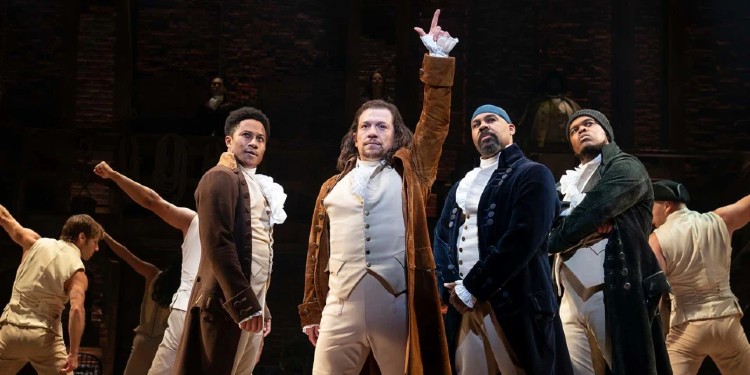
"One Last Time"
Washington tells Hamilton he will not run for another term as president. Though Hamilton wants his mentor to stay on, Washington has the foresight to step down: “If I say goodbye, the nation learns to move on. It outlives me when I’m gone.” Together, they draft his famous farewell address.
Washington literally teaches Hamilton — and the entire country — “how to say goodbye” to him, ensuring the peaceful transition of power needed for a stable democracy.
This song actually quotes paragraphs of Washington’s historic address. will.i.am’s “Yes We Can” video with President Barack Obama inspired Miranda to use a similar technique of layering a political speech with song.
"I Know Him"
King George III makes his third and final appearance in this reprise of “You’ll Be Back.” The lifelong monarch ponders the news that Washington is stepping down: “I wasn't aware that was something a person could do.” When he hears John Adams will be the next president, he is incredulous. “That poor man, they're going to eat him alive!” he exclaims, delighted.

"The Adams Administration"
As predicted, Hamilton struggles without Washington’s protection. Even though he belongs to the same political party as newly elected president John Adams, they do not get along. Adams fires Hamilton, who then writes pamphlets criticizing Adams. These insults are represented by a line that also references the opening number of 1776: “Sit down, John, you fat mother—”
"We Know"
Jefferson, Madison, and Burr know Hamilton paid suspicious sums of money to Reynolds. They accuse Hamilton of treason, which forces him to confess his affair with Maria Reynolds to prove he didn’t do anything illegal (only immoral). Jefferson and Madison promise to be discreet, but Burr is not as amenable: “Rumors only grow. And we both know what we know.”
"Hurricane"
Hamilton attempts to regain control of the situation with his writing skills, as he always has. Whether facing a hurricane or a revolution, “I picked up a pen, I wrote my own deliverance,” he sings. Hamilton decides he will “write [his] way” out of this dilemma, too. And so, he drafts The Reynolds Pamphlet, in which he confesses — in great detail — his affair.
"The Reynolds Pamphlet"
The Reynolds Pamphlet is published, and Jefferson, Madison, and Burr are thrilled because Hamilton has destroyed his reputation and presidential ambitions. Angelica returns to New York to help Eliza. In a verse that echoes “Satisfied,” she makes it clear she does not excuse or forgive Hamilton’s infidelity: “God, I hope you’re satisfied.”
Miranda took dramatic license with this song to raise the stakes. In reality, Angelica came back before the pamphlet's release, and Burr likely already knew about the Reynolds affair — he represented Maria in her divorce from her husband years earlier.

"Burn"
In this heart-wrenching ballad, Eliza reacts to the humiliating Reynolds Pamphlet. She comes to terms with the fact that she “married an Icarus [who] has flown too close to the sun." Eliza retaliates by burning all the love letters that Hamilton ever wrote to her; Chernow suggests this is why there is no written record of their courtship.
With an eye toward the future, she declares, “I’m erasing myself from the narrative. Let future historians wonder how Eliza reacted when you broke her heart.” No longer helpless, Eliza kicks her husband out of their bed and protects her private life from the public eye.
It's worth noting that Eliza frequently references Angelica in "Burn" — even the Icarus metaphor was originally Angelica’s observation. It’s as if she remains present in the Hamiltons' marriage, even from across the pond.
"Blow Us All Away"
Hamilton’s son Philip is now 19, the age Hamilton was at the top of the show. He is naïve, conscious of his father’s legacy, and eager to make his own mark on the world. When George Eacker insults Alexander Hamilton, Philip tries to defend him, and the confrontation escalates into a duel. His father encourages him to throw away his shot instead of bearing the burden of killing someone. Hamilton believes Eacker will do the same “if he’s truly a man of honor,” but George shoots Philip before the duel officially begins.
Philip is played by the performer who portrays John Laurens (who also died young) in the first act.
"Stay Alive (Reprise)"
A doctor tries in vain to save Philip, who has been mortally wounded. As Philip is dying, he says goodbye to his parents. He tells his father he “was aiming for the sky” just as Hamilton said to do. Philip and Eliza reminisce about how she told him to play piano. Philip dies in the middle of a musical phrase.
This reprise harkens back to “Stay Alive” in Act 1 when Eliza implored Hamilton to stay alive during the Revolutionary War so he could meet their son. Now, the parents plead unsuccessfully for their son to stay alive.
"It's Quiet Uptown"
Angelica narrates how Hamilton and Eliza mourn the death of their son. They move uptown and “learn to live with the unimaginable.” The tragedy has rendered the verbose Hamilton painfully quiet. As Hamilton and Eliza support each other through this unbearable time, she starts to forgive him for his infidelity.
Fittingly, for a number about quietness, the orchestration is intentionally sparse and primarily comprised of string instruments.
"The Election of 1800"
“Can we get back to politics?” Jefferson asks as the action turns from the private sphere to the public. Since the Adams administration was a disaster, there is an open presidential seat, and Jefferson and Burr vie for it. “It might be nice to have Hamilton on your side,” Madison counsels Jefferson, to the tune of “Washington On Your Side.” Indeed, Hamilton sways a neck-and-neck race by endorsing Jefferson: “Jefferson has beliefs. Burr has none.”

"Your Obedient Servant"
Burr is outraged at what he perceives as Hamilton’s betrayal. “You’ve kept me from the room where it happens for the last time,” he angrily vows, challenging Hamilton to a duel. The two men exchange stubborn and insulting letters, but in standard fashion for the time, they sign each one as “Your Obedient Servant.” The only thing they agree on (and sing in harmony) is that they’ll meet at dawn in New Jersey with their pistols in tow.
"Best of Wives and Best of Women"
It is the morning of the duel. Hamilton is writing what will be his final letter to his wife. Eliza, who does not know about the duel, tries to convince him to come back to bed, but Hamilton insists he has to get ready for an early meeting. He really did write a goodbye note to Eliza in which he calls her “best of wives and best of women” and says his final thought will be of her.
"The World Was Wide Enough"
This song begins with a reprise of the "ten duel commandments" as the men prepare. Ultimately, Burr shoots Hamilton. Ironically, the brash young man who swore “I am not throwing away my shot” purposely fired his gun into the air, while the cautious man who was “willing to wait for it” rashly aims to kill. Burr says he was thinking about Theodosia: “This man will not make an orphan of my daughter.”
The duel shattered both men's lives. Although Burr lived, he remains known as the man who shot Hamilton: “I survived, but I paid for it.” It is only after the fact that he realizes “the world was wide enough” for both him and Hamilton.
"Who Lives, Who Dies, Who Tells Your Story"
The show’s finale begins with a reminder from Washington that you have no control over how you are remembered. For example, Jefferson and Madison grudgingly admit that Hamilton and his financial plan were an asset to the country: “He doesn’t get enough credit for all the credit he gave us.”
In the end, Eliza keeps Hamilton’s legacy. After putting herself “back in the narrative,” she becomes an important sociopolitical figure, fundraising and speaking out for important causes. She founds the first private orphanage in the city that still operates today, and she does it all in Hamilton's memory. The company comes together to sing the show’s final lines which — like the show’s opening lines — ask a question: “Who lives, who dies, who tells your story?”
Additional Hamilton songs
The show features a 47th musical number which is not included on the album. “Tomorrow There’ll Be More of Us” is a brief musical interlude just before “Non-Stop,” when Hamilton learns of John Laurens's death in battle after the war already ended. The number 47 is significant, as it’s the age at which Hamilton died.
Aside from the show, there is a companion album to Hamilton called The Hamilton Mixtape with cut songs from the musical and covers of some songs from the show by pop, hip-hop, and R&B artists.
Get Hamilton tickets now.
Photo credit: Hamilton on Broadway. (Photos by Joan Marcus)
Frequently asked questions
What is Hamilton about?
A sensation that made Lin-Manuel Miranda a household name, Hamilton made history with 11 Tony wins. A diverse cast and hip-hop music reimagine the story of Founding Father Alexander Hamilton for today. Sharp wordplay, an evocative story, and emotional performances make Hamilton revolutionary. Experience history anew and get Hamilton tickets.
Where is Hamilton playing?
Hamilton is playing at Richard Rodgers Theatre. The theatre is located at 226 W. 46th Street (between Broadway and 8th Avenue), New York, 10036.
How long is Hamilton?
The running time of Hamilton is 2hr 45min. Incl. 15min intermission.
What's the age requirement for Hamilton?
The recommended age for Hamilton is Ages 10+. Infants are not permitted in the theater..
How do you book tickets for Hamilton?
Book tickets for Hamilton on New York Theatre Guide.
Who wrote Hamilton?
Lin-Manuel Miranda is the sole writer of Hamilton. He based the musical loosely on Alexander Hamilton, a biography written by Ron Chernow. Miranda is also known for writing the score for the Tony-winning musical In the Heights and movies including Encanto and Moana.
Which songs are in Hamilton?
The best-known songs in Hamilton include "The Room Where It Happens," "Satisfied," "Wait For It," "Burn," and "Alexander Hamilton." There are 46 songs in total, and the musical is almost entirely sung-through. Learn about all the songs in Hamilton on Broadway.
Is Hamilton appropriate for kids?
Hamilton is recommended for ages 10 and older, as the show contains some strong language and themes of death, war, and adultery. Please note that children 4 and younger are not permitted in Broadway theatres.
Who directed Hamilton?
Thomas Kail directed Hamilton. He won a 2016 Tony Award for his direction, and he's also known for directing Sweeney Todd and In the Heights.
How many Tony Awards did Hamilton win?
Hamilton won 11 Tony Awards out of 16 nominations in 2016. Its awards included Best Musical, Best Book of a Musical, Best Original Score, Best Direction of a Musical, and Best Choreography.
When did Hamilton open on Broadway?
Hamilton opened in July 2015 at the Richard Rodgers Theatre. It is now the longest-running show to ever play at that venue.
Is Hamilton good?
Hamilton received near-universal critical praise, including from New York Theatre Guide. Our five-star review reads, "Hamilton is a magnificent tapestry where all the elements of theatre are called upon to be their very best... The end result is something much more than the story of one man. It is the story of how we each create our destiny and our mark on the world."
Originally published on
